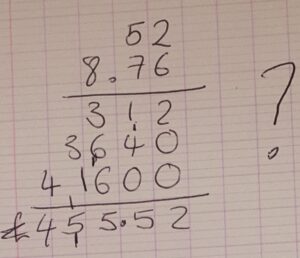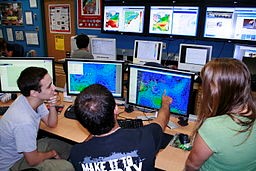Most young people and most young parents have grown up with the internet. How many adults own a functioning calculator? The battery died in mine and I didn’t notice. When I wanted to find my yearly milk bill (52 x £8.76) I reached for a phone app. Sometimes I use a spreadsheet, and I know teenagers who just google their answers.
What would you do?
Written long multiplication?
Really?
We have different tools now, so should parents expect their children to be learning the same mathematics that they did? In England the national curriculum for mathematics has not changed since 2013. The list of mathematical skills to be learnt does not include the powerful digital aids that people actually use to help them be mathematical in their lives and work.
Last month, a committee of mathematicians, computer scientists, scientists and educators at the Royal Society made the case for a new approach in schools. They recommended that mathematics should become mathematical and data education (MDE) for everyone:
“Mathematics, data and statistics are ever-present and increasingly influence our daily lives, whether as employees, citizens or consumers. They support decision-making by governments, guide industry and business, and feature prominently in research and innovation in all sectors. We must therefore ensure that all young people learn how to engage confidently with a data and digitally rich world.” (The Royal Society, 2024)
There are three elements in their MDE proposals:
Familiar mathematics topics such as mental recall of multiplication facts (times tables), algebra, angles and (for some) calculus are important concepts for fluent problem solving and would be taught as foundational and advanced mathematics. Digital tools would be used when appropriate. For example, primary school children could write a simple computer program that gives the next twenty numbers in a sequence.

Source: https://commons.wikimedia.org/wiki/File:OOI_Data_Education_Venues
Alongside this, students will work on quantitative literacy, using mathematics and technology to ask and answer questions about real-world data in social, health, financial and scientific contexts. Older children will analyse graphs from the news, or learn how health risks are communicated. Importantly, they would learn how they and others can use the personal data they supply through their digital activities.
Across the curriculum, in subjects such as geography, business, psychology, students would learn about some specific data and mathematical tools used in those subjects, called domain-specific competences.
Much of the work done in quantitative literacy or in other subjects would not be simply right or wrong – there could be several sensible answers depending on what people consider important in the situation. (For example it would have been much more sensible to estimate my milk bill as 50 x £9). Humanising mathematics in this way has the potential to reduce anxiety and to engage students who want to discuss how they can use the abstract ideas they are learning.
The OU contributed to the research underpinning this project. In 2023, three mathematics education academics and two from Computing & Communications reviewed England’s existing school curriculum in mathematics and computing. We made comparisons with international data science curricula and with published reports from government, employers and researchers about the mathematics education that schoolchildren will need to become engaged, informed and successful contributors to society.
You can find a summary of the Royal Society’s proposals, and all the contributing research (including the OU report) at: https://royalsociety.org/news-resources/projects/mathematical-futures/
While the Royal Society report sets a long-term direction, the government is currently consulting on changes to the school curriculum. As a parent, teacher, student or just an interested person you can submit your views here until 22 November.
